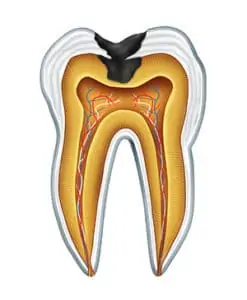
So What Are the Differences in the Cavities?
The first type of cavity, the root cavity, is typically found in older people because their gums tend to recede. When the gums recede, they expose the root of the tooth. Since the roots aren’t covered with enamel it makes them far more vulnerable to decay. When these are treated, the root decay is removed first. The tooth is then generally covered with a crown. If the decay has reached the pulp of the root, it may require a root canal before the crown can be placed.
The second type of cavity is a pit and fissure cavity. These cavities typically strike the chewing surfaces of the teeth. These are usually found on the back teeth where most of the heavy chewing takes place. These are not a result of normal usage of the teeth but usually occur when the patient does not practice regular oral hygiene. These are very common and are vulnerable to food particles sticking in the pits and fissures. Smaller cavities are typically filled but if the hole is to large it will require a crown.
The last type of cavity is the smooth-surface cavity. This is a cavity on the sides of the tooth and is also usually a result of poor oral hygiene. These are the easiest to treat and many times can be handled with fluoride treatments though severe cavities may require fillings. If you have any questions, or if you would like to learn more, please call us today at (503) 765-7300.


